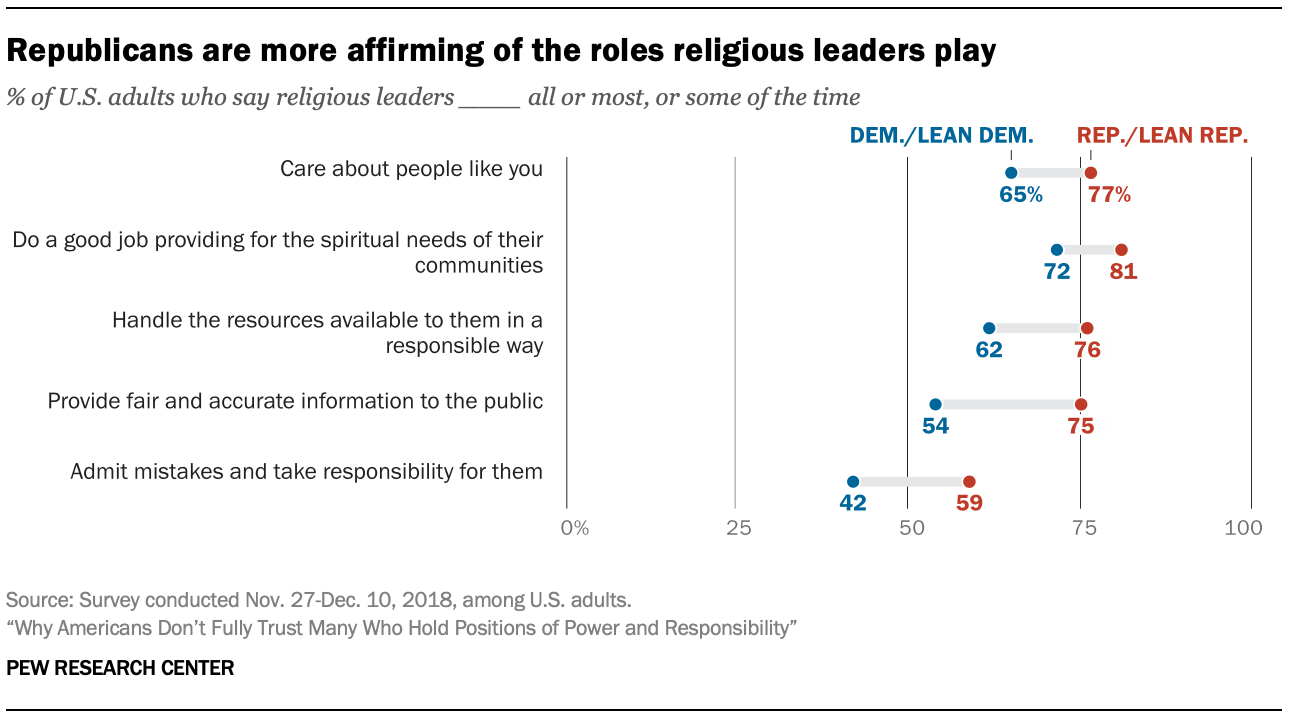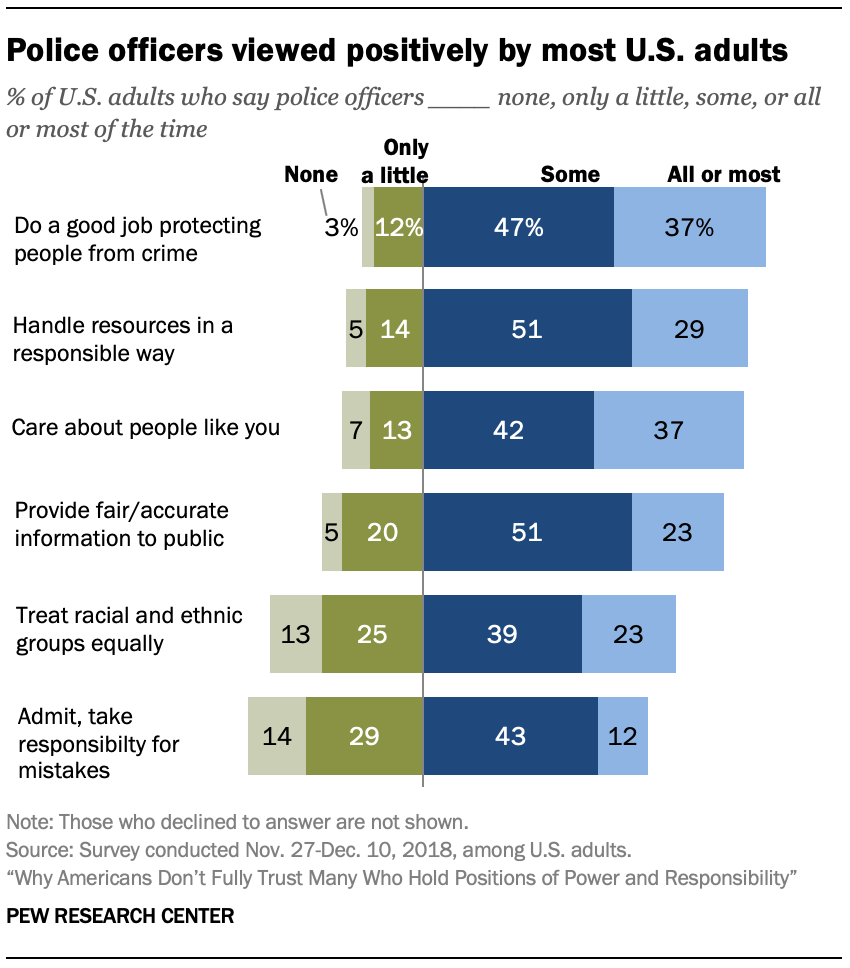Public trust in leaders and those who have jobs that give them power and responsibility can apply to various aspects of their role in national and community life. Not only can people express broad views about their overall trust in leaders, they also can ponder questions about the distinct attributes that underlie elements of trust. In this survey, the Center sought answers about the performance of eight major groups of leaders and people in positions of responsibility: members of Congress, local elected officials, K-12 public school principals, journalists, military leaders, police officers, leaders of technology companies and religious leaders. This effort expands on the overall readings the Center got on public confidence in these groups.1
The questions focused on public judgments about members of each cohort:
- Level of empathy
- Adequacy in performing a specific part of their job
- Stewardship of resources
- Ability to provide fair and accurate information to their constituents
- Willingness to admit mistakes and take responsibility for them
- Frequency with which they behave unethically
- Frequency with which they face serious consequences when they act unethically
Four nearly identical questions were asked about the potentially positive aspects of the performance of all eight groups.2 The questions focus on how often those who have positions of power and responsibility in these groups care about the people “like you” or those they serve, whether they handle the resources available to them in a responsible way, the degree to which they provide fair and accurate information to the public, and whether they admit their mistakes and take responsibility for them. The response options were “all or most of the time,” “some of the time,” “only a little of the time” and “none of the time.” In most of the analysis in this report, those who answered either “all or most of the time” or “some of the time” are combined, as are those who answered “only a little of the time” or “none of the time.”
Across these four measures, the survey finds that public school principals, police officers and military leaders receive high marks from the public for empathy, managing resources, transparency and accountability in their work. For instance, about eight-in-ten U.S. adults say K-12 public school principals care about the students in their schools “all or most of the time” or “some of the time” (84%). Large majorities also say police officers and military leaders “care about people like you” at least some of the time (79% and 73%, respectively). Similarly, roughly three-quarters or more believe principals, police officers and military leaders “handle the resources available to them in a responsible way.” Moreover, majorities of U.S. adults also say these three groups regularly provide fair and accurate information to the public.
Meanwhile, members of Congress and leaders of technology companies tend to receive lower ratings for empathy, transparency and accountability. Roughly half of U.S. adults (49%) say members of Congress care about the people they represent “none of the time” or “only a little of the time.” Similar shares of adults say the same about tech leaders. Additionally, 55% believe tech leaders admit mistakes and take responsibility for them none or a little of the time.
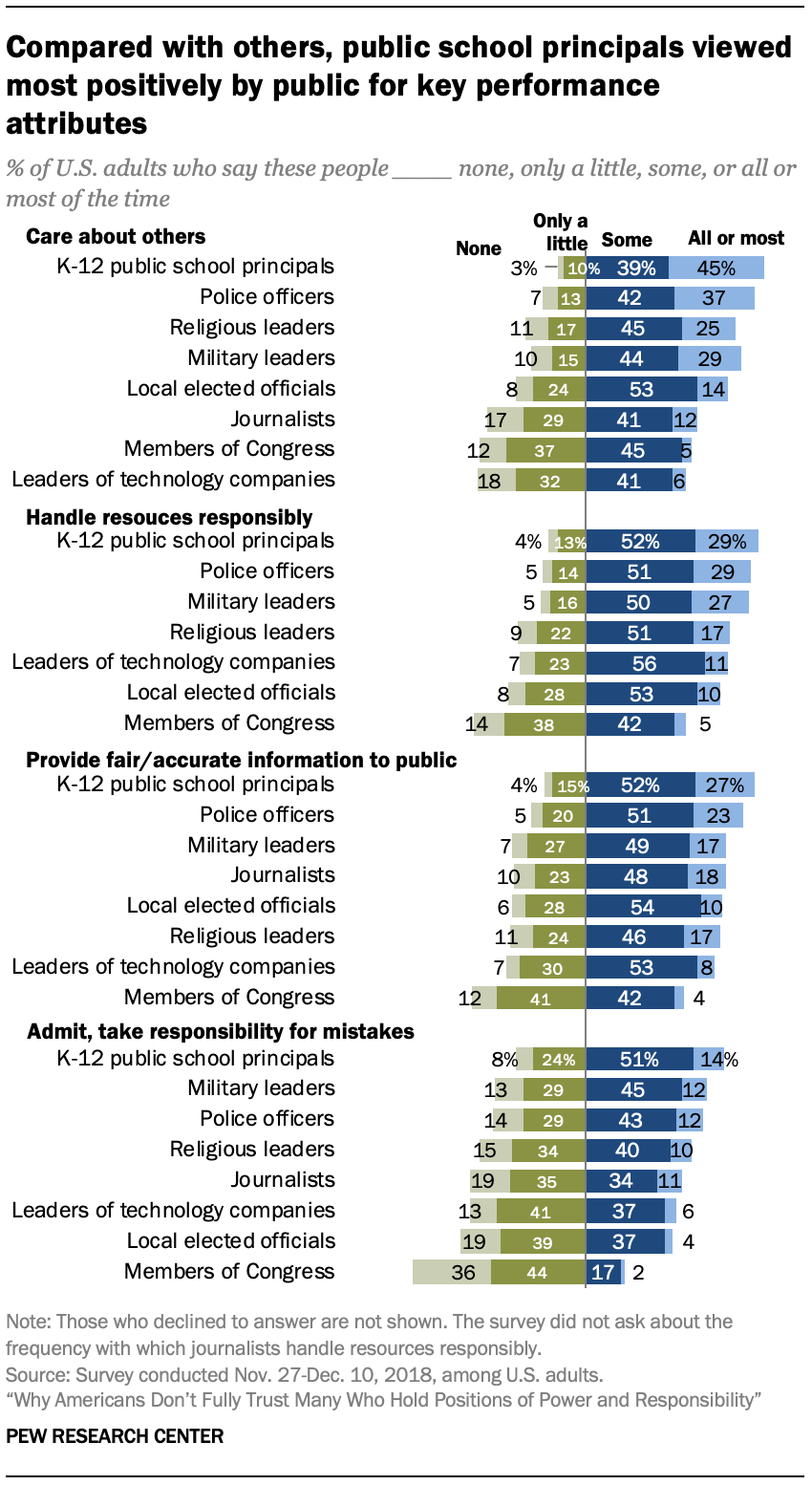
While local elected officials do not garner overwhelmingly high levels of confidence from the U.S. public along these confidence measures, they tend to be viewed in a more positive light than members of Congress. For instance, two-thirds of U.S. adults say local elected officials care about their constituents at least some of the time, compared with just half who say the same about members of Congress. About six-in-ten say local elected officials provide fair and accurate information to the public “all or most” or “some of the time” (64%) while fewer than half say members of Congress do this on a regular basis (46%).
Across these four questions, Americans express somewhat mixed views of religious leaders and journalists. Seven-in-ten U.S. adults say that religious leaders care about people like them “all or most” or “some of the time.” A similar share (68%) say religious leaders regularly handle the resources available to them responsibly. At the same time, the public is divided over how often religious leaders admit their mistakes and take responsibility for them: Half say they do this at least some of the time, while a nearly identical share say religious leaders take responsibility for their mistakes only a little (34%) or none of the time (15%). Americans also are divided about the role journalists play in society. Roughly half (53%) say journalists care about people like them at least some of the time, and 46% think journalists rarely care about people like them.
At a time when partisan divisions are deeper than ever, Republicans and Democrats are united in their negative views of members of Congress and their more positive opinions of local elected officials. But Americans’ opinions of police officers, military leaders and religious leaders are splintered along partisan lines. Furthermore, some of the deepest divides between partisans are over their opinions of journalists. Republicans are consistently more distrustful of journalists than Democrats are, which is in line with past research on Americans’ views of the news media.
The survey also finds that levels of confidence these groups varies along demographic lines, with many large differences among racial and ethnic groups. White Americans tend to express more confidence in major groups – especially police officers – while black and Hispanic Americans tend to hold somewhat more negative opinions about the performance of individuals in these groups. The findings about different demographic groups’ trust in people in these positions of responsibility will be covered in more detail in individual sections about each of the eight cohorts.
Military leaders rank at the top for performing job-specific duties, while members of Congress rank at the bottom
When asked to rate how frequently each of the eight groups perform duties specific to their jobs, the U.S. public ranks military leaders at the top. Fully nine-in-ten say military leaders do a good job preparing military personnel to protect the country “all or most” (56%) or “some of the time” (34%).
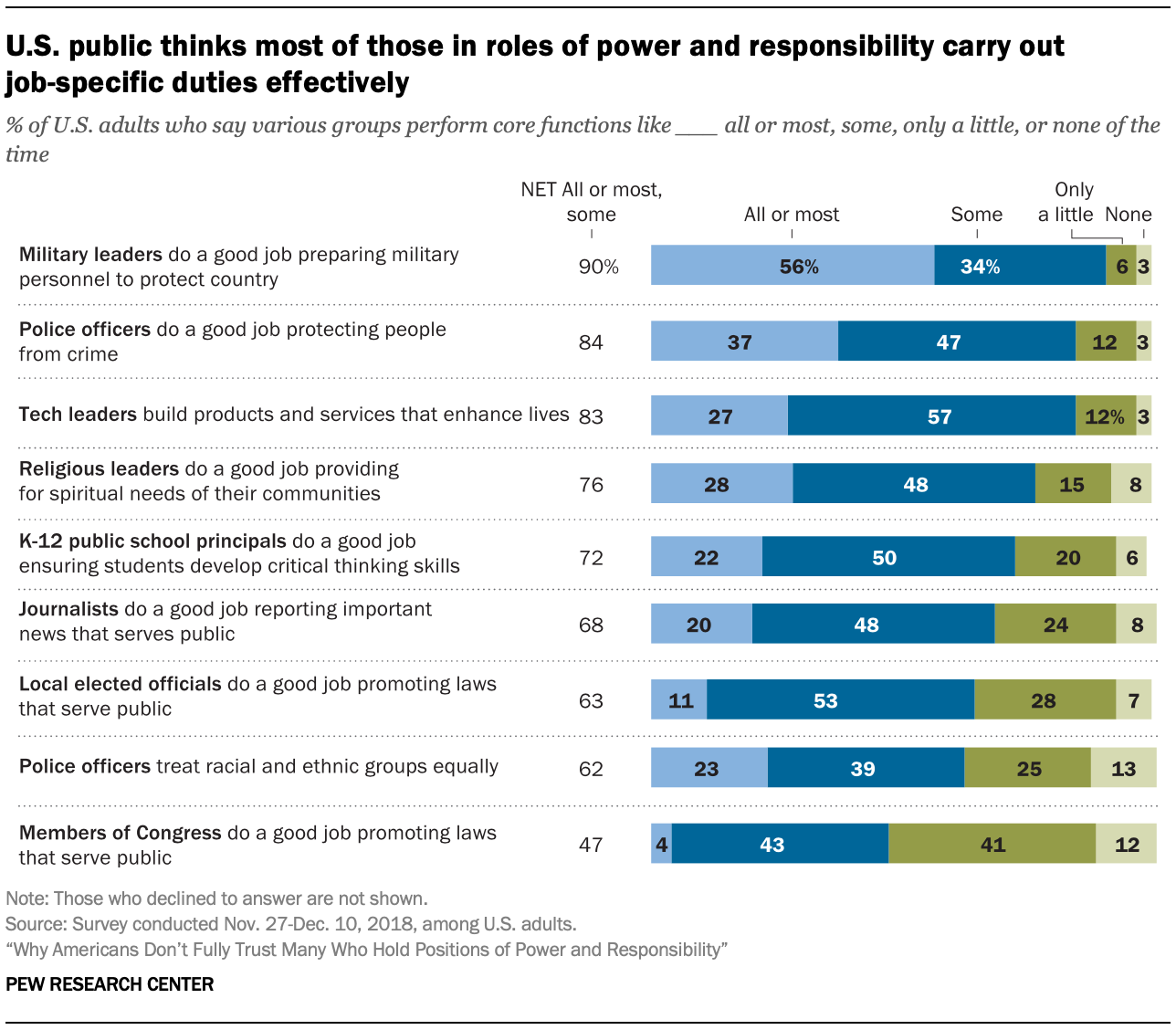
Police officers also rank near the top for their efforts to protect people from crime, with more than eight-in-ten U.S. adults saying police officers do this “all or most” (37%) or “some of the time” (47%). But police officers do not receive such overwhelmingly positive reviews for some other aspects of their jobs asked about in the survey. U.S. adults also were asked to assess how often police officers treat racial and ethnic groups equally, and a smaller majority say police officers treat racial and ethnic groups equally at least some of the time (62%). At the same time, nearly four-in-ten say police officers treat racial minorities fairly only a little or none of the time (37%).
Leaders of technology companies receive relatively high praise for building products and services that enhance people’s lives, with more than eight-in-ten U.S. adults saying tech leaders do this at least some of the time (83%). Religious leaders also are viewed as doing a good job providing for the spiritual needs of their communities.
On the other end of the spectrum are government officials. About half of U.S. adults say members of Congress do a good job promoting laws and policies that serve the public “all or most” (4%) or “some of the time” (43%), and a somewhat larger share say they do this “only a little” or “none of the time” (53%).
At the same time, local elected officials also rank toward the bottom for promoting laws and policies that serve the public, though Americans think local officials perform this key aspect of their job more often than members of Congress do. Roughly six-in-ten (63%) say local elected officials do a good job promoting laws and policies that serve the public at least some of the time, compared with a smaller share (47%) who say members of Congress do this.
Public school principals and journalists also receive mostly positive ratings for performing critical parts of their jobs. A majority of U.S. adults say that K-12 public school principals do a good job ensuring that students are developing critical thinking and problem-solving skills (72%). And a similar share (68%) says that journalists do a good job reporting important news that serves the public interest at least some of the time.
The next sections of this report cover insights specific to these eight major clusters of people in organizations that have power and responsibility.
Members of Congress: Eight-in-ten U.S. adults believe they take responsibility for their mistakes a little or none of the time
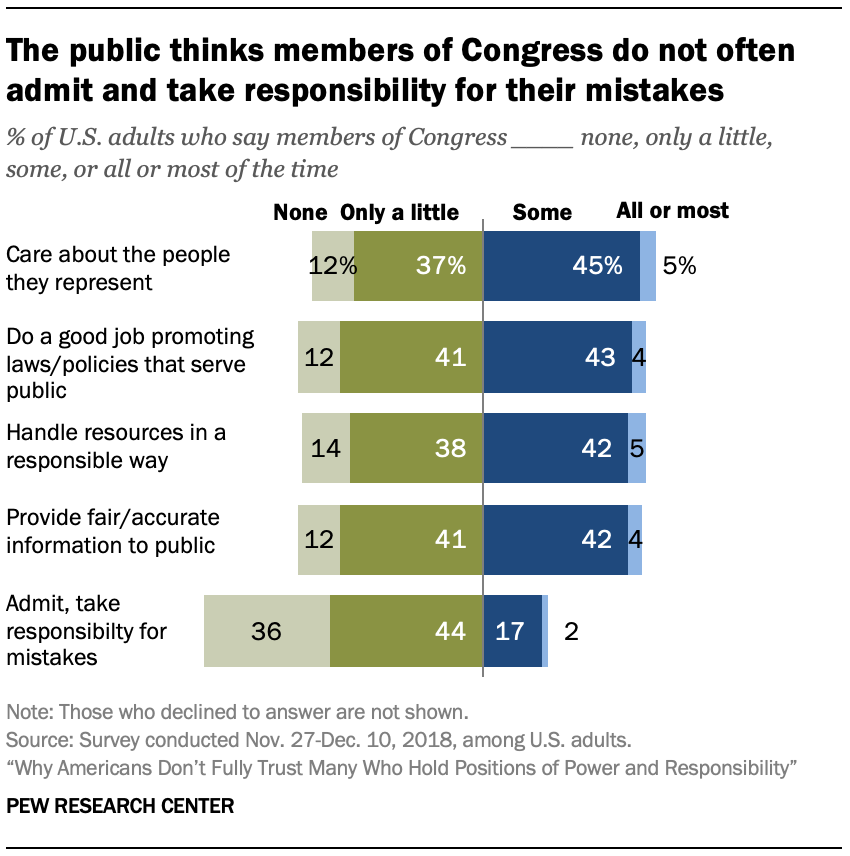
Overall, U.S. adults have relatively negative views about whether members of Congress are consistently performing key elements of their jobs, at least in comparison with their assessments of other groups. About half of adults say that “some of the time” or “all or most of the time” members of Congress care about the people they represent (50%), do a good job promoting laws and policies that serve the public (47%), and handle the resources available to them in a responsible way (47%). And 46% of adults say members of Congress provide fair and accurate information to the public at least some of the time.
Very few U.S. adults think members of Congress are performing their duties “all or most of the time.” For instance, 5% of U.S. adults say members of Congress care about the people they represent or handle their resources responsibly all or most of the time. Similarly, just 4% of U.S. adults say members of Congress do a good job promoting laws and policies that serve the public or provide fair and accurate information to the public all or most of the time.
Members of Congress receive overwhelmingly negative marks from the public for their willingness to admit mistakes and take responsibility for them. Just one-in-five U.S. adults say members of Congress do this at least some of the time, including just 2% who think members of Congress are held accountable for their mistakes “all or most of the time.” By contrast, about eight-in-ten U.S. adults say members of Congress admit mistakes and are held accountable for them only a little (44%) or none of the time (36%).
Dissatisfaction with members of Congress crosses party lines, with Republicans and Democrats rating members of Congress similarly across most questions asked in the survey. For instance, roughly half of Republicans and Democrats (and those who lean toward each party) say members of Congress care about their constituents at least some of the time. And just one-in-five in each partisan camp say members of Congress admit their mistakes and take responsibility for them “all or most” or “some of the time.” But there is a small partisan difference in opinion about use of resources by members of Congress. Half of Democrats and those who lean toward the Democratic Party say members of Congress use the resources available to them in a responsible way at least some of the time, compared with a slightly smaller share of Republicans and Republican leaners who say this (43%).
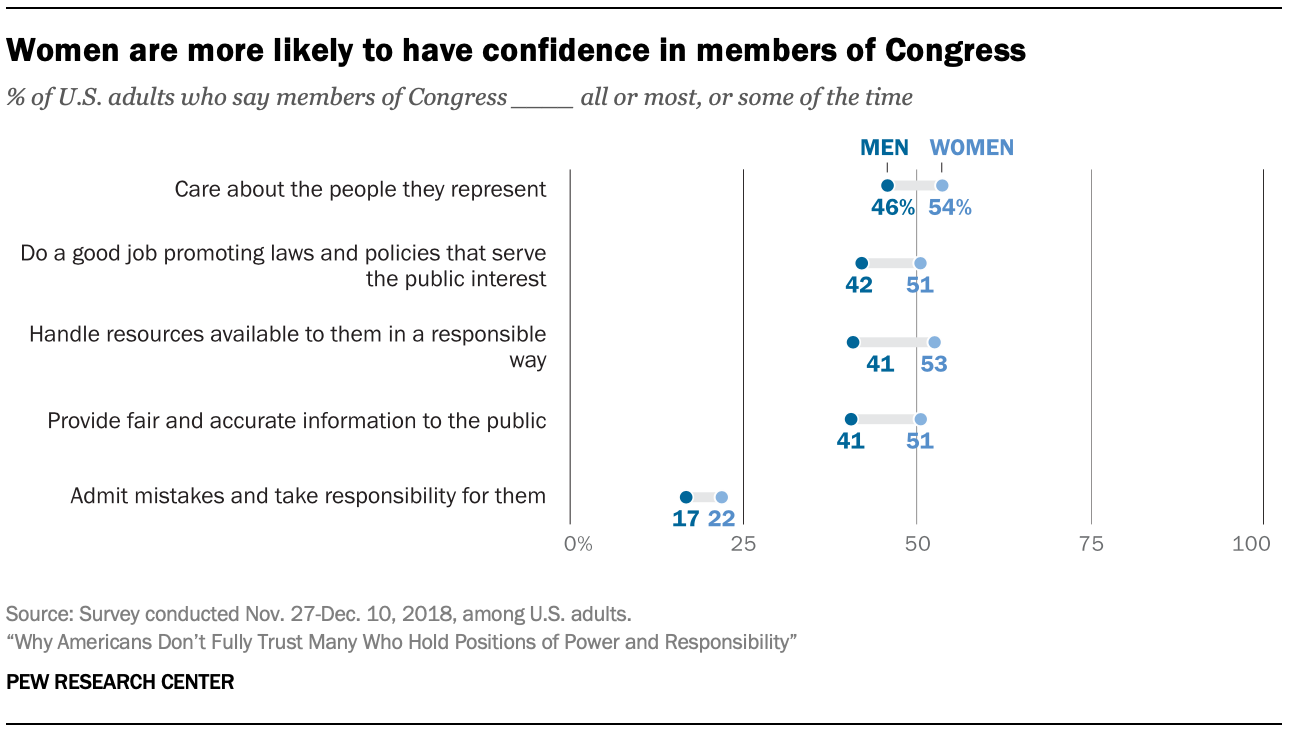
Views of Congress diverge along gender lines. Across all five questions asked in the survey, women are more likely than men to say that members of Congress consistently perform key aspects of their jobs, though both women and men are not confident that members of Congress admit mistakes and take responsibility for them. (A full table of the demographic and partisan answers on these issues can be found in Appendix A.)
Local elected officials: People view them more positively than members of Congress
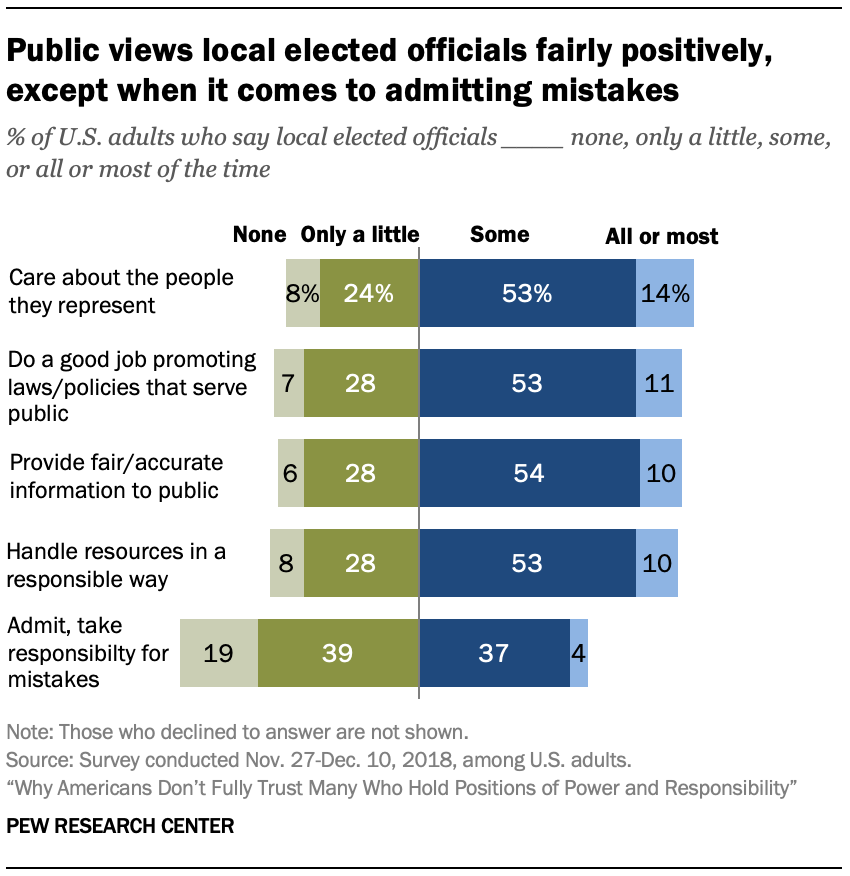
Compared with members of Congress, Americans view the actions of local elected officials much more favorably. Two-thirds of U.S. adults think local elected officials care about the people they represent “all or most” (14%) or “some of the time” (53%). Similar shares say local elected officials do a good job promoting policies that serve the public and that they handle the resources available to them in a responsible way at least some of the time (63% each). And 64% say that local officials provide fair and accurate information to the public with that regularity.
Much like their opinions about members of Congress, U.S. adults tend to hold a negative opinion of local officials’ ability to admit mistakes and take responsibility for them. A majority say local elected officials take responsibility for their mistakes only a little or none of the time (57%), while fewer (41%) think they take responsibility at least some of the time.
White respondents are more likely than black respondents to say that “all or most of the time” or “some of the time” local elected officials care about the people they represent (72% vs. 57%), do a good job promoting laws that serve the public interest (68% vs. 52%) and provide fair and accurate information to the public (68% vs. 52%).
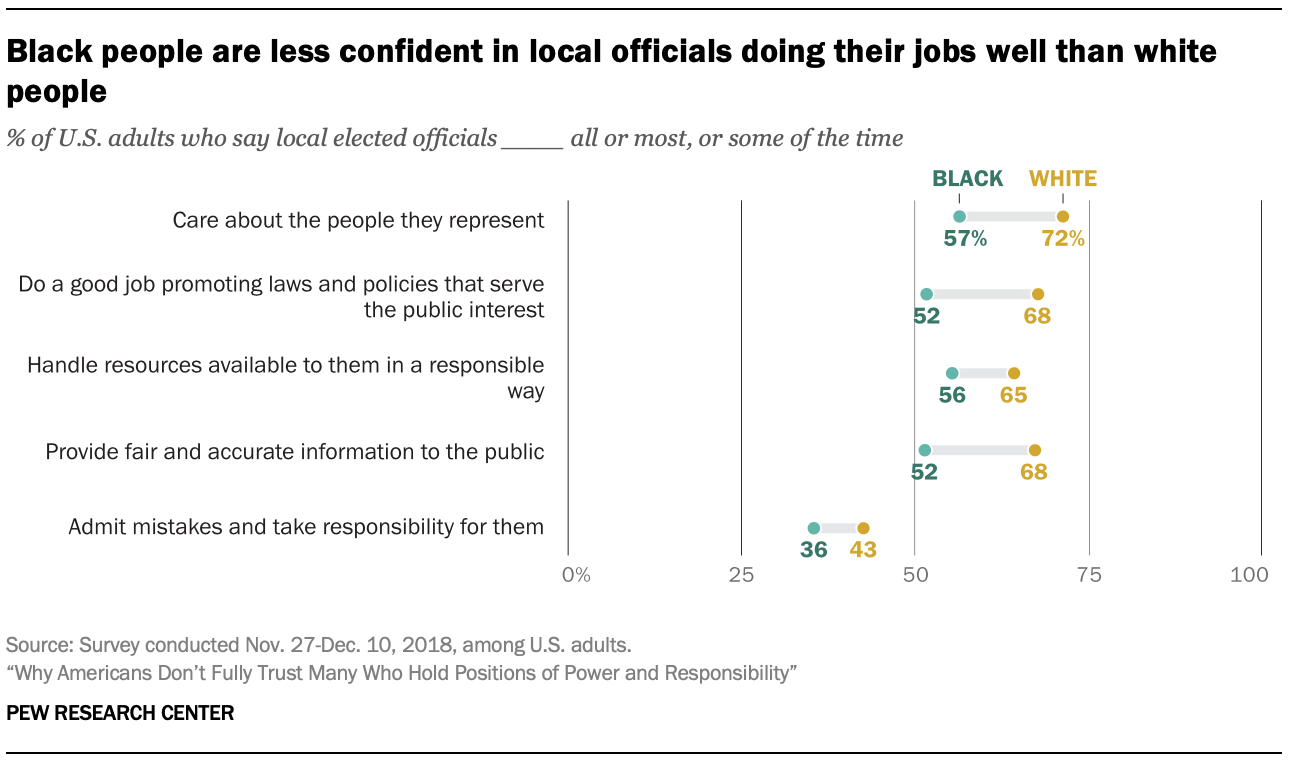
U.S. adults who have graduated from college are more likely than those with less education to say local elected officials care about the people they represent “some” or “most or all of the time” (77% vs. 62%), do a good job promoting laws and policies that serve the public (73% vs. 59%), handle resources responsibly (70% vs. 60%) and provide fair and accurate information to the public at least some of the time (71% vs. 61%).
Partisans are generally united in their negative opinions of members of Congress, and that tends to be the case in their views of local elected officials, but opinions about local officials tend to be more positive overall. There is little difference in opinion between Republicans and Democrats (and their respective leaners) when the question focuses on whether local officials do a good job promoting policies that serve the public, handle their resources responsibly and provide fair and accurate information to the public. Republicans and Democrats also share similar – and fairly negative – views about local elected officials taking responsibility for their mistakes. Roughly four-in-ten in each group say local elected officials admit and take responsibility for their mistakes at least some of the time. (A full table of the demographic and partisan answers on these issues can be found in Appendix A.)
Journalists: U.S. adults have mixed opinions of journalists, with large differences in opinion among partisans
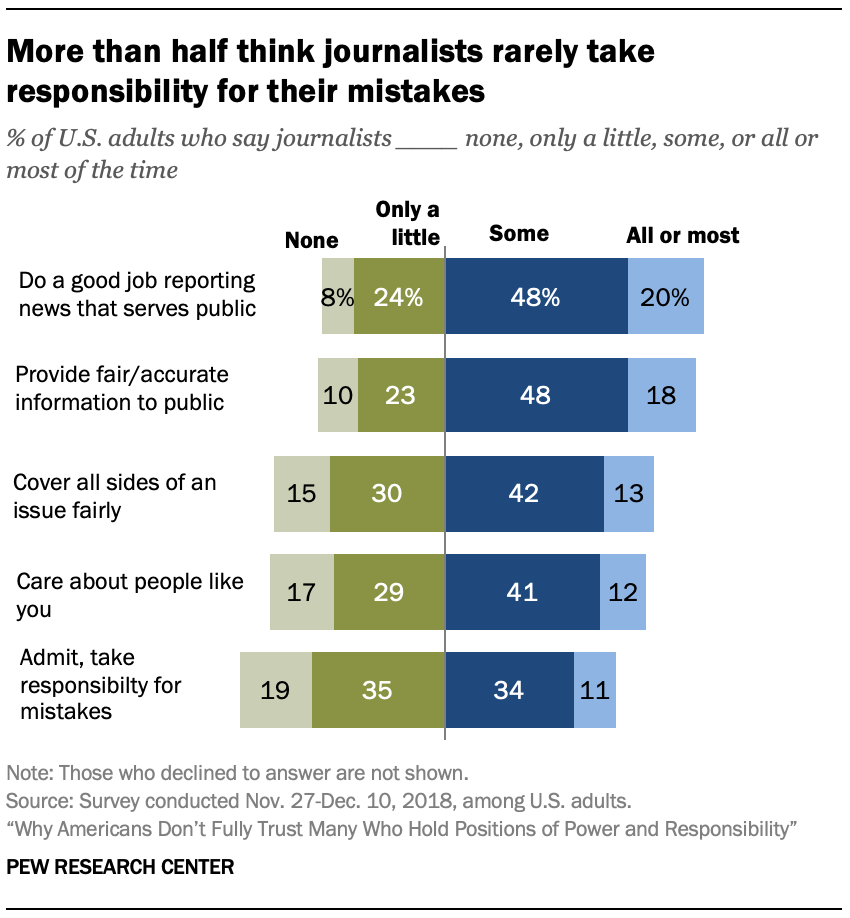
Overall, Americans have varied opinions about the role that journalists play in society. For example, two-thirds say that “all or most” or “some of the time” journalists do a good job reporting important news that serves the public (68%) and that journalists regularly provide fair and accurate information to the public (66%). But journalists receive lower ratings for being unbiased in their coverage of issues: 55% of U.S. adults say journalists cover all sides of an issue fairly at least some of the time. And a similar share of U.S. adults say journalists care about people like them some of the time or more often (53%).3
Fewer than half of U.S. adults say journalists admit and take responsibility for their mistakes at least some of the time (45%), while a somewhat larger share of the public thinks journalists take responsibility for errors only a little or none of the time (54%).
Opinions about journalists differ along political and demographic lines. Republicans and Democrats report widely different opinions about journalists, with Republicans viewing journalists in a more negative light than Democrats do. These partisan differences are especially apparent when it comes to whether journalists provide fair and accurate reporting. For instance, about three-quarters of Democrats and those who lean toward the Democratic party (74%) say journalists cover all sides of an issue fairly at least some of the time, but just three-in-ten (31%) Republicans and Republican leaners say the same – a 43-percentage-point difference in opinion between the two groups. Furthermore, more than eight-in-ten Democrats (84%) think that journalists regularly provide fair and accurate information to the public, compared with fewer than half of Republicans who say this (45%).
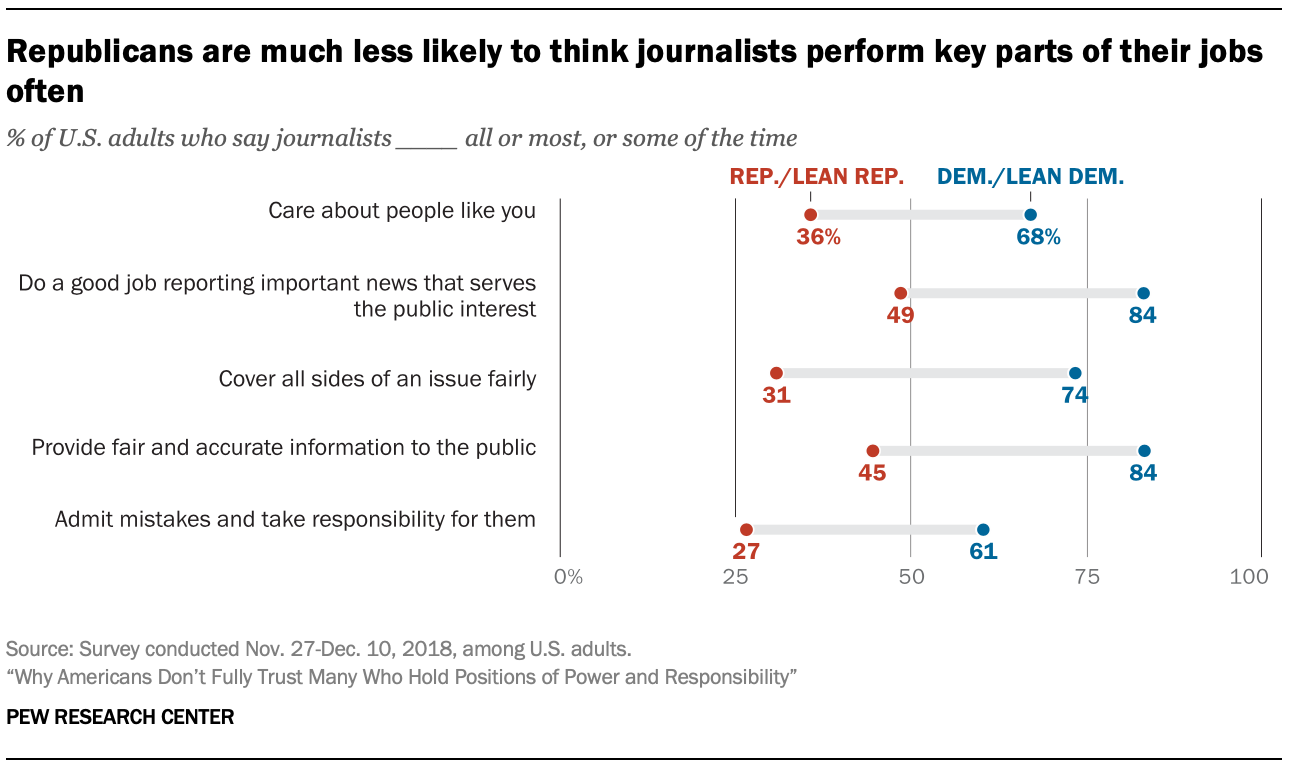
Women, black Americans and college graduates are more likely than others to report positive opinions about journalists performing key aspects of their jobs. (A full table of the demographic and partisan answers on these issues can be found in Appendix A.)
K-12 public school principals: Public views about them are overwhelmingly positive
In general, Americans have high opinions of K-12 public school principals. More than eight-in-ten (84%) say public school principals care about the students in their schools at least some of the time, and 81% believe school principals mostly handle their resources responsibly.
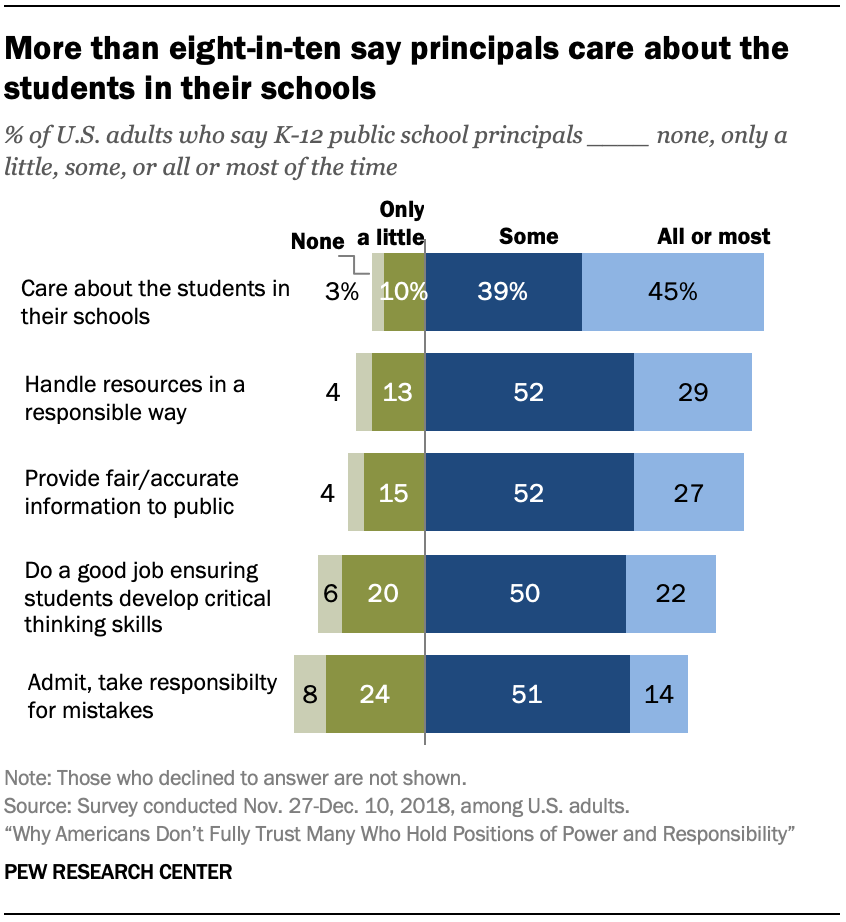
In addition, large majorities believe that at least some of the time principals provide fair and accurate information to the public (79%) and do a good job ensuring that students are developing critical thinking and problem-solving skills (72%).
K-12 public school principals do stand apart from some other powerful cohorts in the eyes of the public when it comes to admitting and taking responsibility for mistakes. By a two-to-one margin, more U.S. adults say school principals take responsibility for their mistakes “all or most” or “some of the time” (65%) than say that principals take responsibility for mistakes “only a little” or “none of the time” (32%).
While opinions of public school principals are high across all demographic groups, there are some modest differences in opinion among different segments of the population. Democrats and those who lean toward the Democratic Party are more likely than Republicans to think public school principals consistently perform key aspects of their jobs. For instance, Democrats and leaners are more likely than Republicans and their leaners to believe that at least some of the time principals handle resources in a responsible way (87% vs. 76%) and do a good job ensuring that students are developing critical thinking and problem-solving skills (76% vs. 68%).
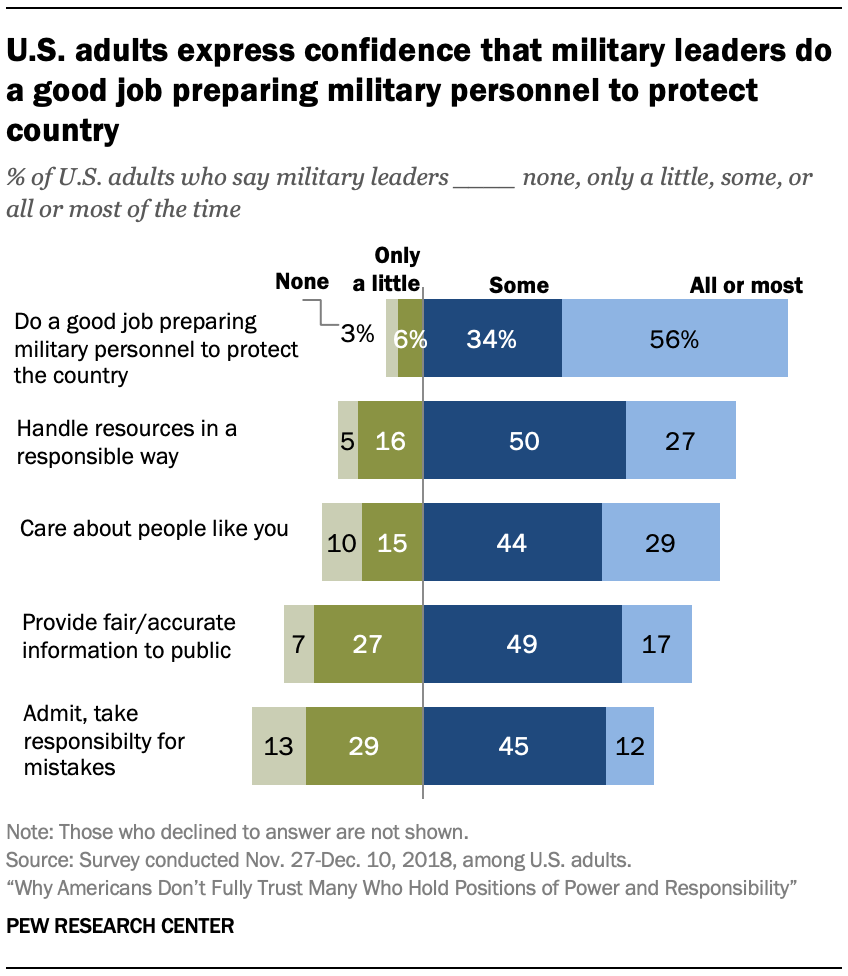
A similar pattern is seen along gender and education lines. Women and those with college degrees give higher ratings to principals than do men and those with less education across all five questions asked about in the survey. Additionally, black people are more likely than white people to have confidence in high school principals, notably on the issue of at least some of the time doing a good job ensuring that students are developing critical thinking skills (84% of blacks say this vs. 71% of whites) and admitting mistakes and taking responsibility for them (76% vs. 66%). (A full table of the demographic and partisan answers on these issues can be found in Appendix A.)
Military leaders: Americans give high ratings to military leaders
The U.S. public ranks military leaders highly on these various dimensions of trust. For instance, military leaders are viewed as performing well at key aspects of their jobs. This includes nine-in-ten U.S. adults who say that at least some of the time military leaders do a good job preparing military personnel to protect the country and 77% who say they handle the resources available to them in a responsible way.
Most also endorse the way military leaders interact with the public. Roughly three-quarters (73%) say that military leaders care about people at least some of the time, and two-thirds say they provide fair and accurate information to the public “some of the time” or “all or most of the time” (66%).
A majority of U.S. adults express that military leaders admit their mistakes and take responsibility for them “all or most” (12%) or “some of the time” (45%). Still, a sizable minority (42%) thinks military leaders admit and take responsibility for their mistakes only a little or none of the time.
However, while high praise for military leaders is fairly consistent across subgroups, some groups of Americans are even more likely than others to express that military leaders perform their jobs well with at least some frequency. For example, across most questions asked in the survey, women and adults ages 50 and older are more likely than men and younger adults (under the age of 50) to approve of the job military leaders are doing. (A full table of the demographic and partisan answers on these issues can be found in Appendix A.)
While members of both political parties tend to endorse the job that military leaders are doing, there are some large gaps along partisan lines in opinions about military leaders. Republicans and those who lean toward the Republican Party are more likely than Democrats and Democratic leaners to say military leaders perform key aspects of their job on regular basis. Republicans are 20 points more likely than Democrats to say military leaders handle the resources available in a responsible way some of the time or more often (89% vs. 69%).
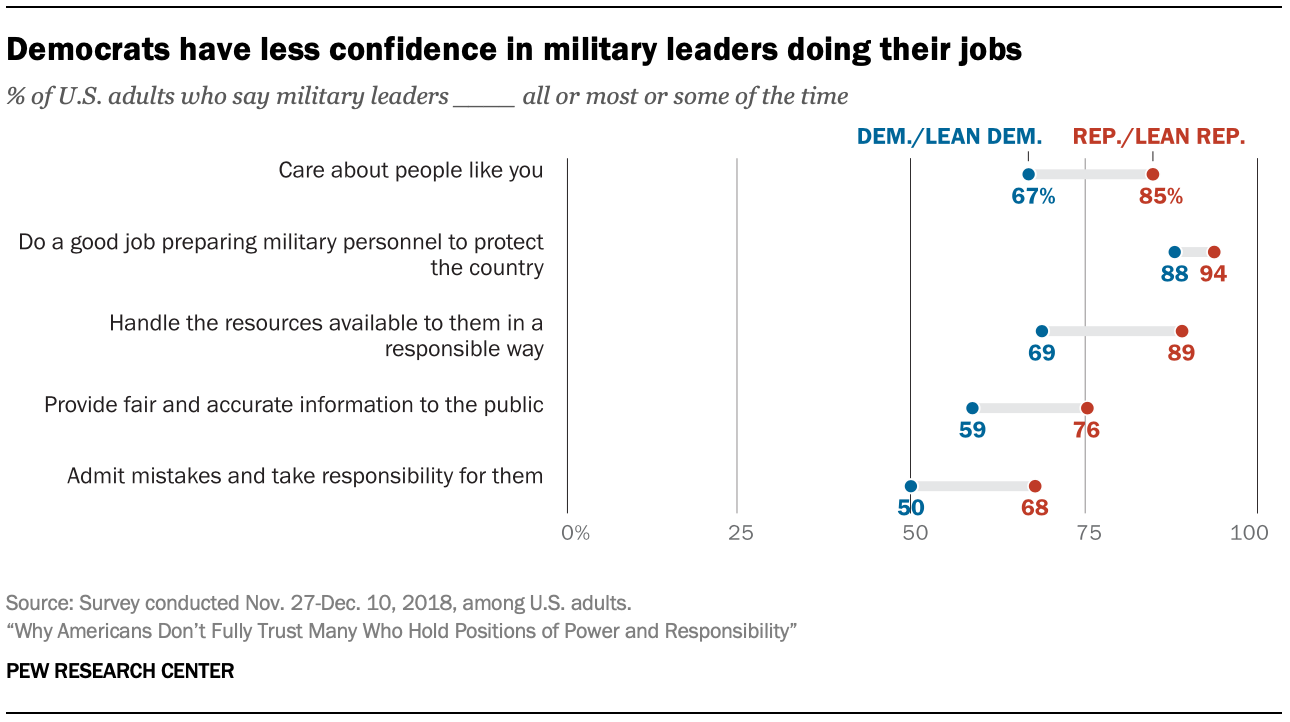
A similar divide exists over how often military leaders care about others and the frequency with which they take responsibility for their mistakes. More than eight-in-ten Republicans (85%) say military leaders care about Americans at least some of the time, compared with fewer Democrats (67%). And two-thirds of Republicans think military leaders regularly admit their mistakes and take responsibility for them, while just half of Democrats say the same.
Police officers: They are seen positively, but several groups express less confidence in them
Police officers also are viewed in a positive light by the U.S. public. More than eight-in-ten (84%) U.S. adults say police officers protect people from crime “all or most” or “some of the time.” Three-quarters or more also say that police officers care about people (79%), responsibly handle the resources available to them (79%) and provide fair and accurate information to the public (74%) at least some of the time.4
A smaller majority says that police officers treat racial and ethnic groups equally at least some of the time (62%). And just slightly more than half think police officers admit their mistakes and take responsibility for them at least some of the time (55%).
But opinions about police officers differ widely by racial and ethnic group, with white people holding more positive opinions about police officers than black people and Hispanics do. This racial and ethnic divide is most apparent when it comes to police officers treating all racial and ethnic groups equally. Roughly seven-in-ten white Americans (72%) say police officers treat racial and ethnic groups equally at least some of the time. By way of comparison, half of Hispanics and just 33% of black adults say the same. The racial divide extends beyond opinions about police officers treating racial and ethnic groups equally. Across all six questions asked about police officers, whites are more likely than both Hispanic and black Americans to express positive views of police officers.
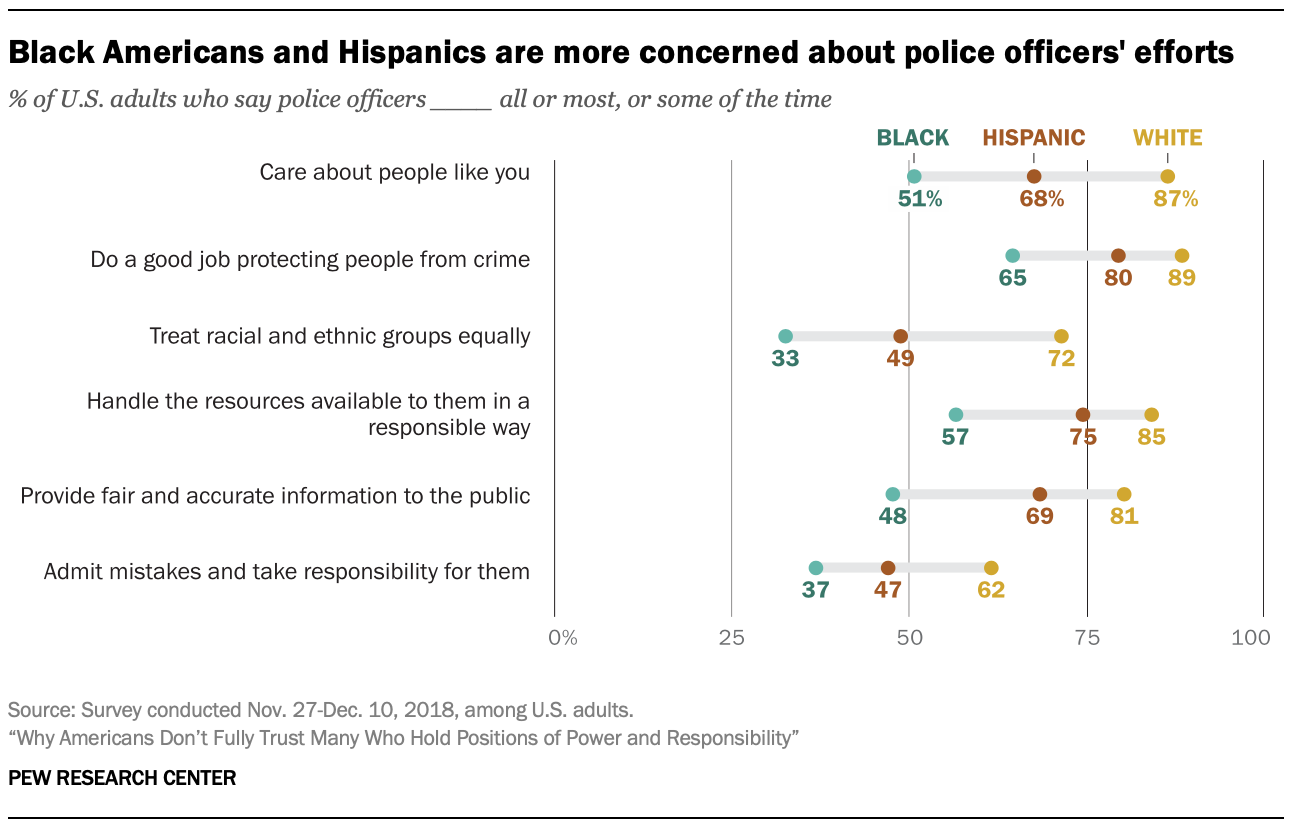
Both Republicans and Democrats share positive opinions about the frequency with which police officers care about people, do a good job protecting people from crime and handle resources responsibly. But Republicans and the independents who lean toward the Republican Party are much more likely than Democrats to express confidence in police officers’ tendency to admit mistakes and take responsibility for them, and to treat racial and ethnic groups equally. About three-quarters of Republicans and those who lean toward the Republican party say that police officers admit their mistakes and take responsibility for them some of the time or more often. Among Democrats and Democratic leaners, just four-in-ten express a similar opinion (42%). And Republicans are about twice as likely as Democrats to think police officers regularly treat racial and ethnic groups equally (87% vs. 43%).
There also are consistent differences in opinion about police officers by age. U.S. adults under the age of 30 generally hold positive opinions about police officers’ job performance, but compared with older adults, the positive opinions of younger Americans lag behind. For example, those under the age of 30 are less likely than their older counterparts to say that “all or most” or “some of the time,” police officers care about people like them, do a good job protecting people from crime, handle their resources responsibly and treat racial and ethnic groups equally. (A full table of the demographic and partisan answers on these issues can be found in Appendix A.)
Leaders of technology companies: U.S. adults confident tech leaders create good products, but doubtful that they care for others
Leaders of technology companies receive somewhat mixed reviews from the public. An overwhelming majority commend tech leaders for creating quality products: eight-in-ten say leaders of technology companies build products and services that enhance people’s lives “all or most” (27%) or some of the time (57%). And smaller majorities say tech leaders handle their resources responsibly and provide accurate information to the public at least some of the time (67% and 61% respectively).
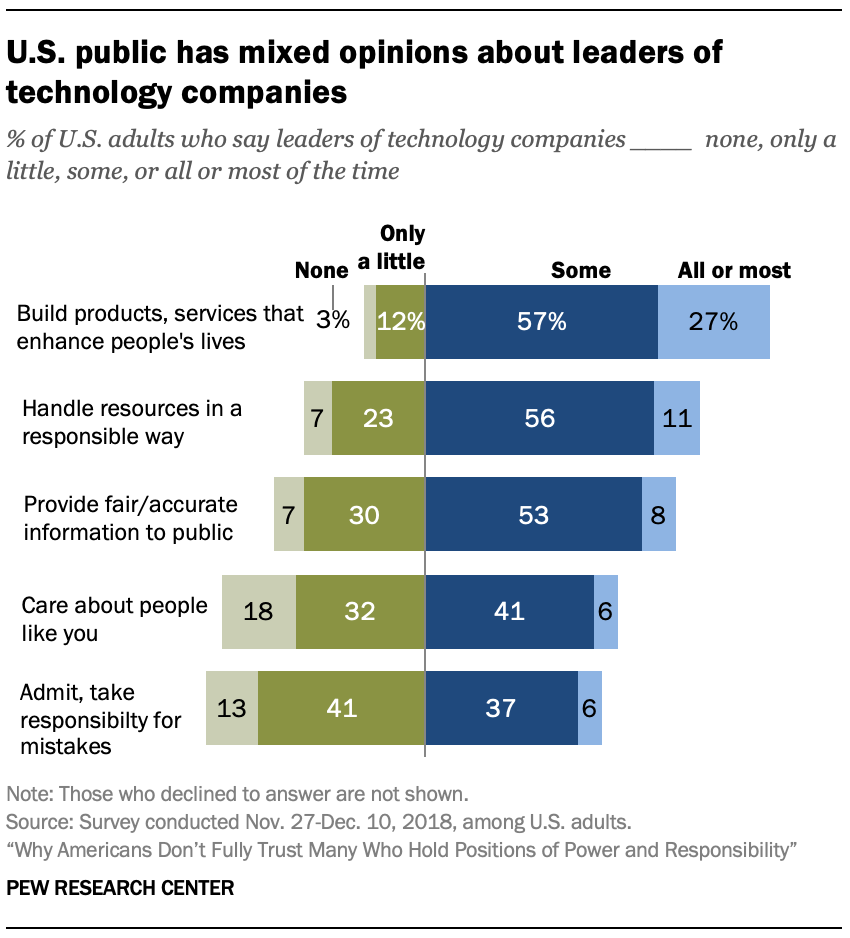
But leaders of technology companies do not earn such high marks when it comes to caring about Americans. Roughly half of U.S. adults say tech leaders care about Americans at least some of the time (48%), while a similar share says tech leaders care about people only a little or none of the time (50%). Furthermore, when it comes to admitting mistakes and taking responsibility for them, the balance of opinion is even more negative. Just over half of Americans (55%) say tech leaders take responsibility for their mistakes only or little or none of the time, while a smaller share (43%) think they regularly take responsibility for their mistakes.
Opinions of tech leaders do not differ much by demographic subgroup, with the opinions of men and women, older and younger adults, college-educated adults and those with less education, and Republicans and Democrats generally mirroring the views of the public as a whole. (A full table of the demographic and partisan answers on these issues can be found in Appendix A.)
Religious leaders: Adults hold generally positive opinions of them, but big differences emerge along religious lines
In general, U.S. adults express positive opinions about the role religious leaders play in their communities. U.S. adults express the most confidence in religious leaders’ ability to fulfill the spiritual needs of their communities on a consistent basis. Three-quarters say religious leaders do a good job providing for the spiritual needs of their communities “all or most” or “some of the time,” while just 23% say religious leaders do this only a little or none of the time. Another seven-in-ten U.S. adults say religious leaders care about people like them at least some of the time.
Nearly seven-in-ten U.S. adults say religious leaders handle the resources available to them in a responsible way at least some of the time. Six-in-ten also say religious leaders provide fair and accurate information to the public “all or most” or “some of the time.”
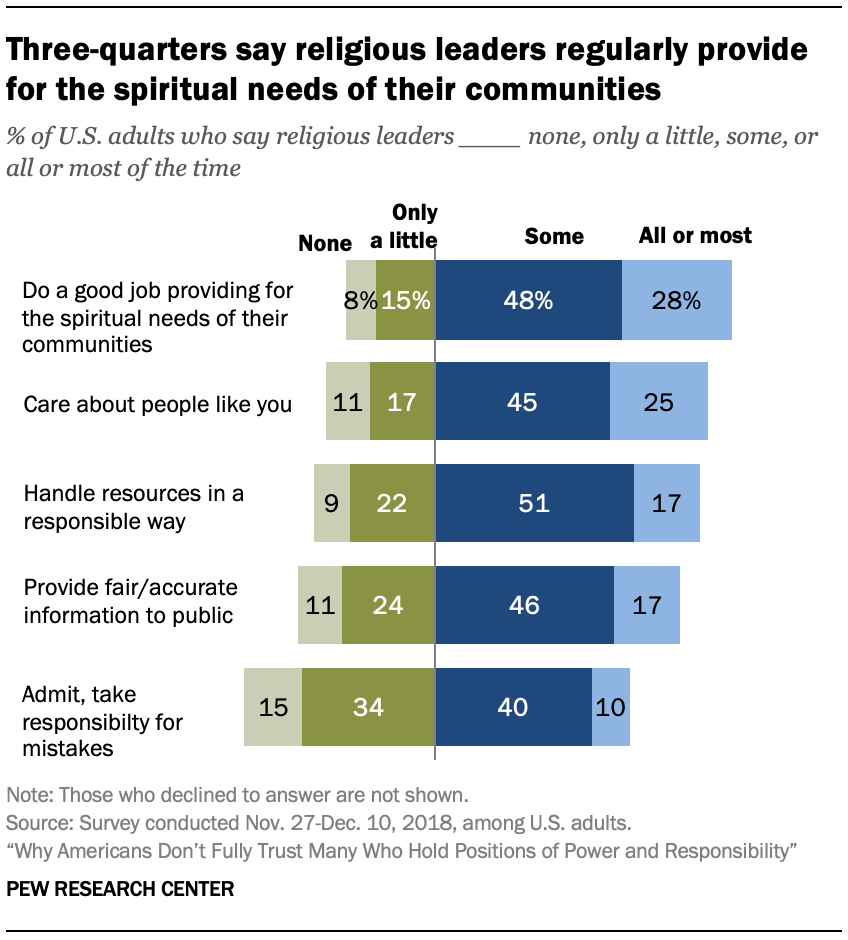
U.S. adults are divided over how frequently religious leaders admit their mistakes and take responsibility for them. Half say religious leaders do this at least some of the time, while half also say religious leaders do this “only a little” or “none of the time.”
Opinions of religious leaders are influenced by religious affiliation and commitment. Not surprisingly, U.S. adults who identify with a religion and those who do not have a religion hold diverging opinions of religious leaders. Across all five measures queried in the survey, religiously affiliated adults are more likely than religiously unaffiliated adults (those who say their religion is atheist, agnostic or “nothing in particular”) to say religious leaders perform key parts of their jobs at least some of the time.
But among U.S. adults who identify with a religious faith, evangelical Protestants are among the groups who hold the most positive opinions about religious leaders. For example, evangelical Protestants are most likely to say religious leaders provide fair and accurate information to the public some of the time or more often.
There also are large differences in opinion about religious leaders based on how often Americans attend religious services. Those who say they attend religious services at least once a week are more likely than those who say they attend services less often to think religious leaders regularly care about people, do a good job providing for the spiritual needs of their communities, handle their resources responsibly, and admit and take responsibility for their mistakes.
Older and younger Americans also hold different views of religious leaders. Those ages 50 and older are consistently more likely than their younger counterparts to give religious leaders higher praise for at least some of the time performing the five job duties asked about in the survey.
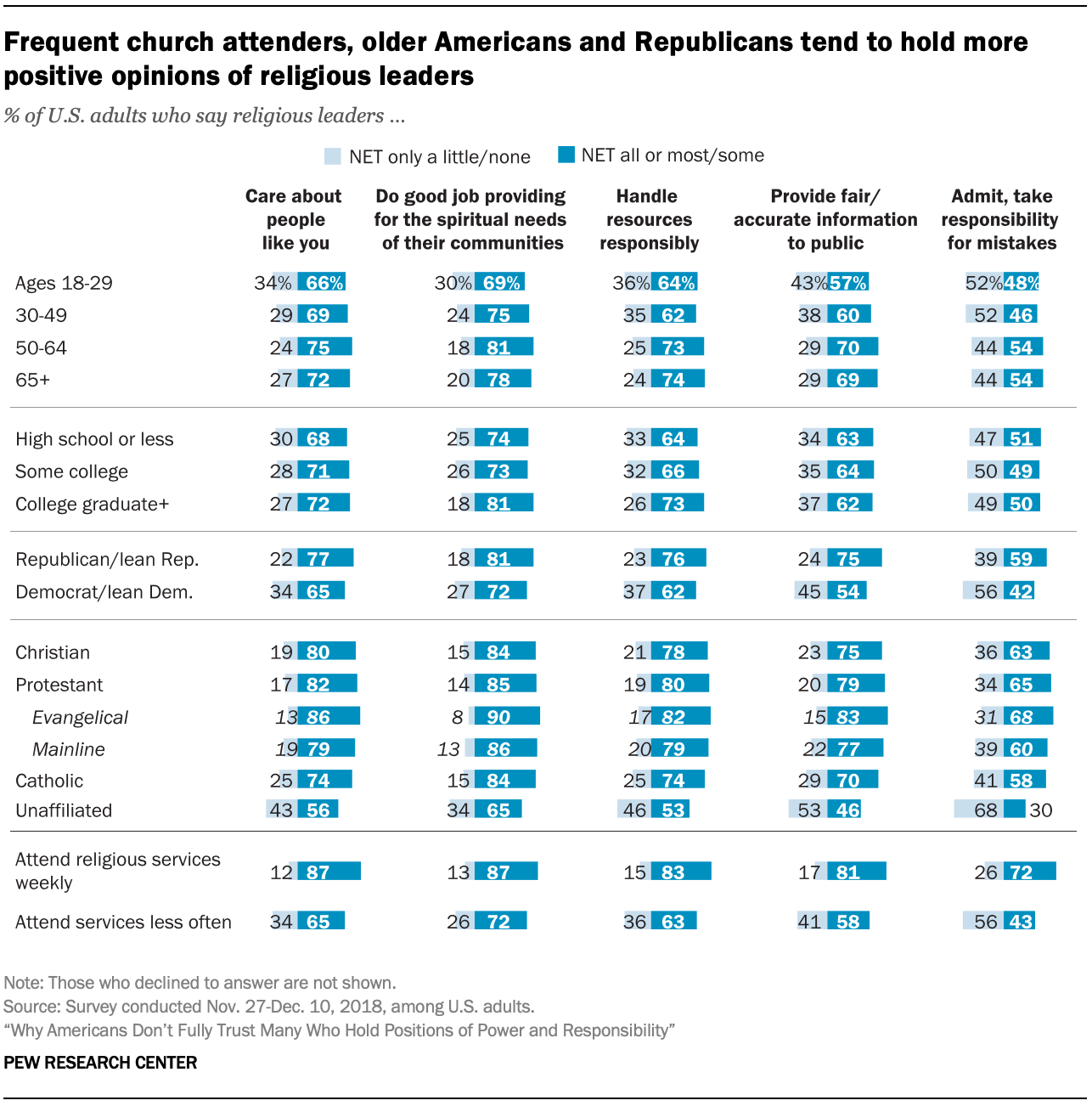
Opinions about the roles of religious leaders also are divided along political lines. Republicans and those who lean toward the Republican Party are more likely than Democrats and those who lean toward the Democratic Party to express positive opinions about religious leaders. For instance, three-quarters of Republicans say religious leaders provide fair and accurate information to the public at least some of time, compared with 54% of Democrats who say the same. And six-in-ten Republicans say religious leaders admit their misstates and take responsibility for them at least some of the time (59%) compared with 42% of Democrats who say this.
